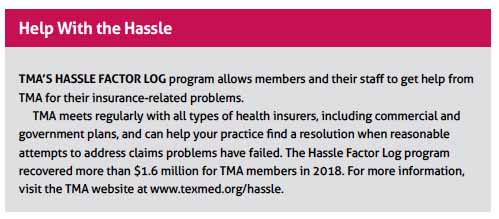
Prior authorizations, in and of themselves, already put practices in a tough position.
Throw in what one Houston dermatologist calls “pure incompetence” – resulting in an insurer saying you haven’t obtained prior authorization when you have – and it gets even tougher.
Several Houston-area practices say a botched technology conversion by insurer WellCare after it acquired a Medicare Advantage plan led to prior authorization and network confusion, undue denials, and unpaid claims by the barrelful.
For one dermatologist, whose practice asked to remain unnamed for this story, disarray like that can mean choosing between giving a skin-cancer patient a same-day procedure, or telling that patient to come back for the procedure after the prior authorization has been straightened out. That practice has chosen to “continue to take care of patients the way that we think that they should be taken care of,” the physician says, and doing the procedures the same day, hoping the practice will get its rightful money later.
But attempts to straighten out the mess with WellCare, affected practices say, revealed an aggravating lack of claims expertise and uncertainty about who could fix it.
“It’s almost hard to believe that there could be this level of pure incompetence,” the dermatologist told Texas Medicine, calling WellCare’s reasons for rejections “illogical.”
With some success, the Harris County Medical Society (HCMS) and the Texas Medical Association were working together at press time to prod WellCare to correct the problems and process physicians’ claims properly. Practices reported progress on that front.
Oncology Consultants, another affected practice, credits both the county society and TMA for helping to crack through the WellCare wall.
“Until [HCMS] and TMA got involved, we couldn’t get anybody to listen to us,” Oncology Consultants practice manager Katherine Grigsby said.
“A disaster”
In 2017, WellCare acquired Universal American, the corporation that previously operated the TexanPlus Medicare Advantage insurance plan. On Jan. 1, 2019, WellCare Health Plan integrated Universal American into its systems and platforms, according to a company bulletin. On that date, the TexanPlus HMO plan became WellCare Texan Plus for the Houston and Dallas markets, and WellCare Health Plans for the rest of Texas.
During 2018, before TexanPlus’ transition to the WellCare system, the dermatology practice had no claims problems with the plan, says its practice manager.
But by the end of January 2019, the story changed for one of the practice’s offices. Physicians weren’t loaded correctly in the WellCare system, and the practice was getting denials for care, claiming it had not obtained the required prior authorization even though it had. The practice sent screenshots from WellCare’s own online prior authorization system to prove to the insurer the practice had obtained it – and still got denials.
The practice manager said that in calling WellCare for help, “You talk to people that really don’t understand the claims process. They don’t understand coding. It’s just a disaster.”
Despite some success getting paid through WellCare’s appeal process, the problems continued into August.
“Our latest denial was [because] we billed more than Medicare, so they denied the claim altogether,” the practice manager told Texas Medicine. “I have never in my [professional] life of 20-years plus heard that reason as a denial. … It literally just continues to evolve from one thing to another.”
Oncology Consultants also fell victim to the chaos, according to its president, Luis Campos, MD, and Ms. Grigsby.
Dr. Campos describes dealing with WellCare as navigating “very murky water” because the company wasn’t transparent about who among its leadership could address the issue.
“The transition between companies when they were sold has been very erratic, and they don’t carry this up to the next level,” he said. “Therefore, although the high authorities of WellCare say, ‘Oh yeah, this is going to be resolved,’ this is not being resolved, because it appears to be that they don’t have the right people to carry on with this.”
Ms. Grigsby says WellCare did not properly enter patients and practitioners into its system, preventing verification of benefits, authorizations, and referrals. WellCare told her the company had to manually enter both practitioners and patients to fix it.
The problems directly affected patients, too. A WellCare mix-up led a new patient at Oncology Consultants to believe his limited provider organization (LPO) plan would cover an appointment. After Oncology Consultants told him it wasn’t in the LPO’s network, the patient called WellCare, which told him otherwise.
He made an appointment, and despite the practice trying to straighten it out, “The patient [showed up] regardless, at the office in Sugar Land, insisting to be seen,” Ms. Grigsby said. “You would too if you’d been diagnosed with cancers.”
One practice Texas Medicine spoke to said WellCare had finally resolved all of its disputed claims, but not without frustration.
Qudsia Dollar, who manages the Houston internal medicine clinic of her husband, Hunaid Dollar, MD, estimates that WellCare rejected approval for more than 50 of the practice’s venipuncture procedures. WellCare told her the procedures had to be performed at a lab, even though Medicare routinely paid for it when Dr. Dollar’s practice performed it at the office.
“I have been doing billing for 20 years now and have never seen a rejection. … Customer service had no idea what I was talking about. They were questioning me on my coding, and it didn’t get anywhere.”
Eventually, she approached HCMS and used TMA’s Hassle Factor Log to report what was going on. (See “Help With the Hassle,” above.) Each venipuncture pays out only $2.94 to the practice, but that adds up, Mrs. Dollar says.
“Nobody has time in the office to do this extra stuff,” she said. “It’s a clean claim; you should be getting paid for it.”

Making progress
After approaching WellCare for comment, Texas Medicine obtained a statement from the company.
“We understand some Houston providers experienced networking and claims payment challenges following our integration with Universal American. As no two systems are identical, these issues can arise during any integration process,” WellCare said. “In response, WellCare has worked to streamline our processes and identify solutions. We implemented weekly meetings with providers in the area, including the Harris County Medical Society, and increased our staffing, including a designated outreach specialist, to address and resolve issues on an ongoing basis. WellCare is also hosting quality summits across Texas to enhance the provider experience, educate providers on WellCare’s quality initiatives, and discuss Pay-for-Quality programs.”
WellCare said nearly all of its Texas claims are “paid within 30 days, with most payments occurring within 20 days. These turnaround times have consistently improved since the beginning of this year.”
The situation was improving at press time, according to affected practices. The dermatology office said that WellCare appeared to be paying its claims. Dr. Dollar’s office reported that WellCare had paid all of its outstanding claims, with improved customer service. Meanwhile, Oncology Consultants reported in August that the weekly meetings with WellCare, HCMS, and practices were going well.
“We had doctors that we were trying to load in their system. They essentially were in credentialing for over a year,” Ms. Grigsby said. “And now they say they’ve got them loaded and we should see it in 30 days. And we’ll double-check to make sure it happens.”
Dr. Campos would like to see insurers offer two key elements to deal with such a problem: An advance against the practice’s claims, and a “short line” of health-plan personnel with whom the practice can communicate.
“[If we] claim that they owe us, let’s say, $1 million, give me an advance of $500,000 while this continues to be processing,” he said. “Tell me who I can deal with that is going to clear my [claims] in a faster pace, and [that] it’s being done. Because these continue to mount up.”
Tex Med. 2019;115(10):28-29
October 2019 Texas Medicine Contents
Texas Medicine Main Page